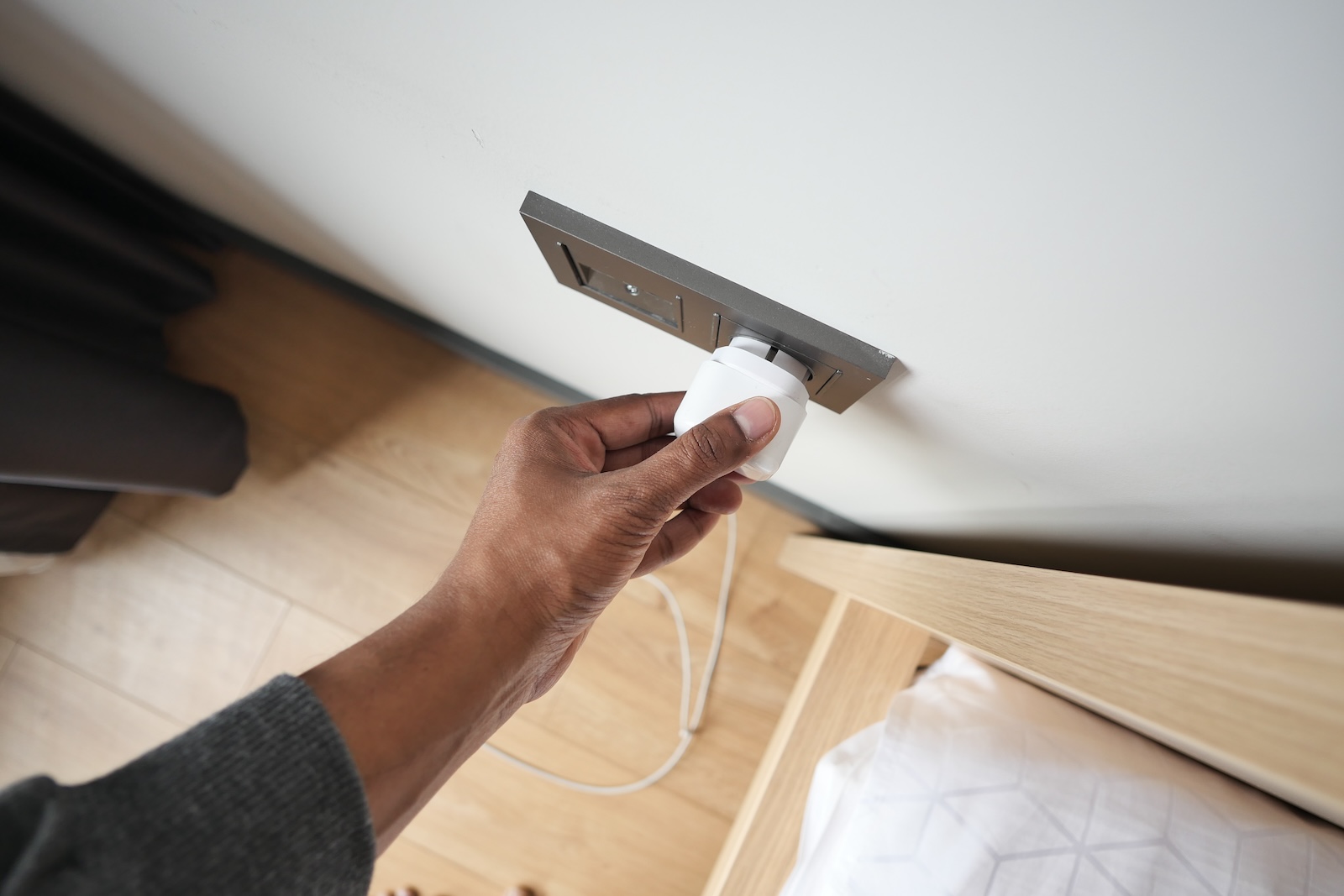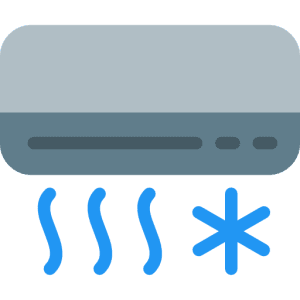Why Does My Outlet Spark When I Plug Something In?

You go to plug in your phone charger and notice a quick flash from the outlet. It’s a moment many homeowners recognize: an outlet sparks when plugging in a device. You’re left wondering, is that normal or something more serious?
The truth is, electrical sparks can mean a few different things. Some are harmless. Others? Not so much.
In this post, we’ll explain why outlets spark, what causes them, and when you should stop and call in a professional. We’ll also share safety tips to help prevent bigger electrical problems down the road.
Why Do Outlets Spark?
Electricity moves fast, and when you plug something in, you’re completing a circuit in an instant. Sometimes, an outlet sparks when plugging something in because of that sudden power flow. While it might seem like it’s not a big deal, it could also be a warning sign because here’s the thing: not all electrical sparks are safe.
Dangerous Outlet Sparks
Do you see a tiny blue flicker when you plug something in? That is nothing to worry about.
What you want to look out for is:
- A big, loud spark
- White or yellow flashes
- A burning smell or scorch marks
All of those are red flags that indicate a deeper issue. According to the City of Charleston’s electrical safety guide, these symptoms can signal serious wiring issues or even fire hazards.
When in doubt, unplug the device right away and leave the outlet alone until it can be thoroughly inspected.
Top Reasons Why Your Electrical Outlet Is Sparking
Let’s outline the common culprits behind surprising outlet sparks:
1. Overloading the Circuit
This happens all the time in older homes. You’ve got multiple high-powered appliances—maybe a microwave, coffee maker, and toaster—all pulling electricity from the same circuit. That much demand creates heat, and heat leads to electrical sparks.
Overloaded outlets can be a major fire risk, especially if your panel hasn’t been updated in years. If your breaker trips often or your lights flicker, it might be time to consider service panel upgrades or replacing your circuit breaker.
2. Short-Circuiting
A short circuit is when a hot wire touches a neutral or ground wire, causing electricity to rush through unexpectedly. It can melt insulation, spark, or shut down your outlet entirely.
Short circuits are one of the top reasons homeowners call us for electrical repairs. If an outlet suddenly stops working, or worse, starts sparking or smoking, there’s a good chance a hidden short is to blame.
3. Moisture Exposure
Water and electricity don’t mix—and when moisture sneaks into your outlets, sparks are almost guaranteed. This is especially common in bathrooms, kitchens, or outdoor outlets that aren’t properly sealed.
If an outlet feels damp or has condensation on it, don’t use it. You might also notice sparking after storms or heavy humidity. Installing GFCI outlets in moisture-prone areas helps cut power quickly when water is detected, preventing shocks or fires.
Don’t have GFCI outlets yet? Upgrading is a smart move, especially in moisture-prone areas like your kitchen or bathroom. It’s one of the simplest ways to boost safety, and something we always recommend through LimRic’s electrical services.
4. Old or Aging Outlets
Unfortunately, outlets don’t last forever. As they age, the metal contacts inside can loosen, leading to weak connections. That’s when arcing occurs, which is tiny sparks that jump between gaps and can quietly damage your wiring over time.
If your outlets are more than 15–20 years old or feel warm to the touch, they could be past their prime. Replacing them is often simple and fast, especially if paired with wiring or rewiring upgrades to bring your system up to modern standards.
5. Faulty or Damaged Wiring
Rodents, corrosion, DIY repairs—there are lots of ways your wiring can become unsafe without you even realizing it. Damaged wires behind walls can create heat buildup, flickering, and sparking when outlets are in use.
If you’re noticing signs like buzzing, crackling sounds, or multiple outlets acting up, it’s worth having an electrician inspect your wiring. Many homeowners discover hidden issues only after a problem occurs, which is why proactive electrical repairs are so vital.
6. Improper Repair or Installation
If your home had a previous renovation or “handyman fix,” the problem might trace back to shoddy workmanship. Loose wires, missing ground connections, or incorrectly wired outlets can all lead to sparking when a plug is inserted.
That’s why we always recommend licensed professionals for electrical upgrades. If you’re worried that your outlets may have been installed improperly, calling a certified pro to check things out can give you peace of mind and prevent bigger problems later.
When to Be Concerned About Sparking
Still not sure whether it’s harmless or a hazard when an outlet sparks after plugging in a cord or device? Keep an eye out for these warning signs:
- Obvious or noisy sparks that flash aggressively
- Long-lasting sparks that don’t disappear instantly
- Bright yellow or white sparks instead of faint blue
- Burning odor, melted plastic, or discoloration around the outlet
These symptoms often indicate more serious electrical issues that require prompt attention. For urgent help, LimRic offers trustworthy emergency electrical services for fast inspections and repairs done by licensed professionals.
Avoid Electrical Hazards With These Prevention Tips
Sparking outlets don’t just appear out of nowhere — there are ways to prevent them before they start. Here are a few steps you can take to keep your home’s electrical system in top shape:
- Install GFCI outlets in kitchens, bathrooms, laundry rooms, and anywhere water is present. These outlets shut off automatically when moisture is detected, reducing the risk of shocks and sparks.
- Use a whole-home surge protector to manage power surges from lightning strikes or high-energy appliances. This helps extend the life of your electronics and keeps your outlets safe. Whole-home surge protection is one of the smartest investments you can make.
- Replace frayed charging cables and damaged plugs. Worn cords can expose internal wiring, leading to sparks the moment you try to plug them into an outlet.
- Upgrade outdated wiring. If your home was built before the 1980s, there’s a good chance the wiring may need to be updated. Professional wiring and rewiring services can help bring your home up to today’s standards.
- Avoid plugging in appliances while they’re turned on. Switching on the appliance after it’s plugged in lowers the risk of creating a spark from sudden power demand.
Simple maintenance and smart upgrades can go a long way in protecting your home and family from avoidable electrical dangers.
Need Electrical Help? Call the Experts at LimRic
If sparks are coming from your outlets—or if something just doesn’t feel right—it’s time to let a pro take a look.
LimRic’s licensed electricians serve homeowners throughout Charleston with trusted, code-compliant electrical repairs and upgrades. Whether you need new outlets, panel upgrades, surge protection, or a full inspection, we’re here to help.
Let us keep your home powered safely. With LimRic, no matter the problem, it’s always: “Call Today, Comfortable Tonight!”
FAQs
Is it dangerous if a plug sparks?
Sometimes yes, sometimes no—it all depends on the situation. If your outlet sparks when plugging in a device, it might just be a harmless flash. But large or frequent sparking, especially with a burning smell, usually means something’s wrong. It may indicate that you are dealing with damaged wiring, an overloaded circuit, or a worn-out outlet.
Is it safe to use an outlet that sparked?
If it only happened once and the spark was small, it may not be a pressing issue. But if it happens regularly, the outlet is hot to the touch, or you continue seeing other signs like flickering lights, stop using the outlet and call a professional right away. Continued use only increases the risk of an electrical fire.
Should I unplug something that sparked?
Yes, you should unplug it immediately. Unplugging the device helps cut off power and prevent further issues. Once unplugged, avoid using that outlet until it’s been checked by a licensed electrician. If you’re unsure what caused the spark, call for help before plugging anything back in.












